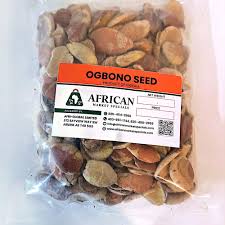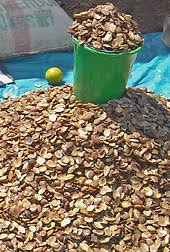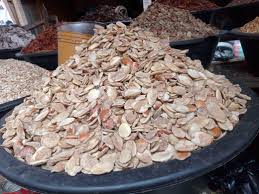Ogbono, also known as wild mango or African bush mango (Irvingia gabonensis), has a long history and deep cultural significance in Nigeria. It is indigenous to West and Central Africa, where its seeds are prized for their culinary and medicinal uses. In Nigeria, Ogbono seeds are particularly valued for making a thick, nutritious soup that is widely consumed across various ethnic groups. The history of Ogbono in Nigeria dates back centuries, with its use being passed down through generations, making it a staple food in many households.
Traditionally, Ogbono seeds were collected from the wild, as they grew abundantly in forests and woodlands. Local communities often relied on these seeds as an important source of protein and essential nutrients. The seeds are typically dried and ground into a fine powder, which serves as the base for Ogbono soup, a popular dish that is enjoyed with staples like fufu, pounded yam, or eba. Ogbono soup has become an iconic dish in Nigerian cuisine, particularly among the Igbo, Yoruba, and other ethnic groups in the southern parts of the country.
Culturally, Ogbono holds significant value in Nigeria. Its use transcends mere nourishment, as the soup made from Ogbono seeds is often associated with communal gatherings, celebrations, and family bonding. In many Nigerian households, the preparation of Ogbono soup is seen as a special occasion, especially during festive periods, traditional ceremonies, or when hosting important guests. The process of making the soup is often passed down from mothers to daughters, symbolizing the transmission of culinary heritage and family traditions.
In some parts of Nigeria, Ogbono has even taken on a symbolic role in marriage customs and dowry practices. It is sometimes included in the list of items a groom is expected to provide to the bride’s family as part of the traditional marriage rites. This further highlights its importance in the social and cultural fabric of Nigerian society.
The medicinal properties of Ogbono seeds are also worth noting. In traditional Nigerian medicine, the seeds have been used to treat a variety of ailments, ranging from digestive issues to fever and inflammation. Recent scientific studies have explored the potential health benefits of Ogbono seeds, particularly their role in promoting weight loss, improving heart health, and managing cholesterol levels. These findings have only enhanced the value of Ogbono in modern-day Nigeria.
The history and cultural significance of Ogbono in Nigeria is deeply rooted in the country’s culinary, social, and medicinal traditions. Its continued popularity today is a testament to the enduring legacy of this humble seed, which remains an integral part of Nigerian life. From its role in traditional meals to its medicinal applications, Ogbono continues to bridge the gap between past and present, preserving a piece of Nigerian heritage that is both nutritious and culturally meaningful.
The Role of Ogbono in Ancient Nigerian Culinary Practices

1. Key Ingredient in Soups: Ogbono seeds have long been used as a thickening agent in traditional Nigerian soups, such as Ogbono soup, which is still a staple in Nigerian households today, especially among the Igbo, Yoruba, and Efik people.
2. Preservation and Storage: In ancient times, Ogbono seeds were dried and stored for long periods, allowing families to prepare soups and stews during the dry season when fresh vegetables were scarce, making it a valuable food security crop.
3. Flavor Enhancer: Apart from thickening soups, the seeds imparted a unique flavor and texture to dishes, making Ogbono soup a distinctive culinary tradition that was often served with fufu, yam, or other starchy accompaniments.
4. Use in Festive Occasions: Ogbono soup was often prepared during special occasions, including weddings, funerals, and festivals, and served to guests as a symbol of hospitality, abundance, and community spirit.
5. Culinary Techniques: The art of preparing Ogbono involved specialized techniques, such as roasting the seeds before grinding, to release their oils and enhance the flavor of the soup, a method passed down through generations.
In pre-colonial Nigerian societies, Ogbono (Irvingia gabonensis) played a crucial role in the daily lives of communities, both as a food source and as part of cultural practices. This indigenous tree, which thrives in the tropical forests of West Africa, was not only valued for its edible seeds but also for its cultural, economic, and medicinal significance.
Historically, Ogbono was harvested from the wild, with local communities relying on traditional knowledge to identify the best seasons for gathering the seeds. The seeds were collected, dried, and ground into a powder, which became a staple ingredient in the preparation of soups and stews. Ogbono soup, known for its unique thickening properties and rich flavor, became a beloved dish across various ethnic groups, including the Igbo, Yoruba, and Efik. It provided a vital source of protein, particularly in areas where other sources of meat and fish were scarce.
The cultural importance of Ogbono extended beyond its nutritional value. In pre-colonial Nigeria, food preparation and sharing were integral to social bonding and community cohesion. Ogbono soup often featured prominently in communal gatherings, celebrations, and rites of passage such as weddings, naming ceremonies, and festivals. The preparation of Ogbono soup was typically a communal affair, involving multiple family members, particularly women, who passed down recipes and cooking techniques through generations. This practice not only strengthened family ties but also reinforced cultural identity, as the soup became associated with specific communities and their traditions.
Moreover, Ogbono had significant economic value in pre-colonial Nigerian societies. The seeds were traded among communities, contributing to local economies and enhancing inter-community relationships. The trade of Ogbono seeds facilitated exchanges of goods and services, further enriching the cultural landscape of the region. In some areas, Ogbono was also used as a form of currency in trade, demonstrating its economic significance beyond mere consumption.
Medicinally, Ogbono was recognized for its health benefits in traditional medicine. Various parts of the tree, including the seeds and bark, were used to treat ailments such as digestive disorders, fevers, and infections. Herbalists and traditional healers incorporated Ogbono into their remedies, highlighting its importance in the holistic health practices of pre-colonial societies. The recognition of Ogbono’s health benefits reflects the sophisticated understanding of plant-based medicine that existed in these communities long before the advent of modern pharmaceuticals.
Cultural Symbolism of Ogbono in Nigerian Festivals and Ceremonies
1. Symbol of Abundance: In many Nigerian festivals, Ogbono is seen as a symbol of abundance and fertility, representing the blessings of nature and the importance of agriculture in sustaining communities.
2. Ritual Offerings: During traditional ceremonies, Ogbono-based dishes are often prepared as offerings to ancestors or deities, signifying respect, gratitude, and the connection between the living and the spiritual world.
3. Community Bonding: The preparation and sharing of Ogbono soup during communal festivities foster social cohesion, as families and neighbors come together to celebrate, share meals, and strengthen community ties.
4. Culinary Heritage: Ogbono soup is featured prominently in wedding ceremonies and cultural celebrations, highlighting the significance of traditional foods in preserving cultural heritage and passing down culinary practices to future generations.
5. Generational Connection: The act of preparing Ogbono dishes often involves multiple generations, allowing for the transmission of culinary skills and cultural stories, reinforcing family bonds and communal identity.
Read Also: 14 Medicinal Health Benefits of Epimedium grandiflorum (Horny Goat Weed)
The Evolution of Ogbono in Modern Nigerian Cuisine

1. Integration into Diverse Dishes: As Nigerian cuisine evolves, Ogbono has been integrated into a wider variety of dishes beyond traditional soups, including stews, sauces, and even as a flavoring in fusion cuisine, showcasing its versatility.
2. Influence of Global Trends: With the rise of global culinary trends, modern chefs in Nigeria experiment with Ogbono, combining it with international ingredients and cooking techniques, thereby revitalizing traditional recipes and appealing to younger generations.
3. Health Consciousness: As awareness of healthy eating increases, Ogbono is recognized for its nutritional benefits, such as its high fiber content and potential health properties, leading to its incorporation into health-focused meals and recipes.
4. Pre-packaged and Convenience Foods: The commercialization of Ogbono has led to the emergence of pre-packaged Ogbono powder, making it easier for busy families to incorporate traditional flavors into their diets without extensive preparation.
5. Culinary Recognition: Ogbono has gained recognition in modern gastronomy, featuring in upscale restaurants and culinary events, where chefs highlight its unique flavors and health benefits, contributing to its status as a gourmet ingredient.
Ogbono as a Staple Food in Nigerian Homes
1. Everyday Consumption: Ogbono soup is a staple dish in many Nigerian households, valued for its hearty texture and rich flavor, making it a regular feature in family meals across various regions of Nigeria.
2. Nutritional Benefits: The nutritional profile of Ogbono, including its high fiber content and healthy fats, makes it a preferred choice for families seeking nutritious, satisfying meals that support overall health.
3. Cultural Tradition: The preparation of Ogbono soup often follows traditional recipes passed down through generations, reinforcing cultural identity and the importance of food as a medium for preserving heritage.
4. Versatile Meal Option: Ogbono can be served with various side dishes, such as fufu, rice, or yam, providing flexibility in meal planning and accommodating different tastes and preferences among family members.
5. Comfort Food: For many Nigerians, Ogbono soup represents comfort food, evoking nostalgia and memories of home-cooked meals, family gatherings, and cultural celebrations.
Regional Variations of Ogbono Preparation Across Nigeria
1. Southeastern Nigeria: In regions like Igbo land, Ogbono soup is often prepared with assorted meats, stockfish, and various vegetables, reflecting the local preferences for rich, flavorful dishes.
2. Southwestern Nigeria: Yoruba communities may incorporate more spices and ingredients like smoked fish or crayfish, creating a distinct flavor profile that complements the use of Ogbono in their soups and stews.
3. Northern Nigeria: While Ogbono is less common in the north, its use is gradually increasing, often adapted to local cooking styles and combined with ingredients like groundnut or beans, showcasing regional culinary creativity.
4. Western Influences: In urban areas, Ogbono preparation may be influenced by modern cooking techniques and international flavors, resulting in innovative dishes that blend traditional and contemporary elements.
5. Cross-Cultural Recipes: The versatility of Ogbono allows for cross-cultural adaptations, where chefs and home cooks experiment with diverse ingredients from different Nigerian cuisines, leading to unique variations in the preparation and presentation of Ogbono-based dishes.
Read Also: Poultry Record Keeping and Performance Evaluation
Ogbono and Its Connection to Nigerian Herbal Medicine

1. Traditional Healing Properties: Ogbono seeds have long been used in Nigerian herbal medicine for their medicinal properties, believed to aid in digestive health, boost the immune system, and help in managing blood sugar levels, making them a key ingredient in natural remedies.
2. Anti-Inflammatory and Antioxidant Benefits: The oil extracted from Ogbono seeds is rich in antioxidants and essential fatty acids, which are used to reduce inflammation, promote wound healing, and protect cells from damage, playing an important role in herbal treatments.
3. Weight Loss and Metabolism: Ogbono seeds are valued in Nigerian traditional medicine for their ability to support weight loss by curbing appetite and boosting metabolism, often recommended as part of herbal weight management regimens.
4. Support for Heart Health: Ogbono contains healthy fats, which are considered beneficial in managing cholesterol levels and promoting heart health, making it a component in remedies aimed at improving cardiovascular function in herbal medicine.
5. Use in Diabetic Management: Ogbono is commonly used in herbal treatments for diabetes in Nigeria due to its potential to regulate blood sugar levels, making it a part of natural therapies designed to manage and prevent diabetes in traditional medicine practices.
The Economic Importance of Ogbono in Nigerian Markets
1. A Lucrative Commodity: Ogbono is an economically significant product in Nigerian markets due to its demand for both culinary and medicinal uses, contributing to the livelihoods of many farmers and traders who cultivate, harvest, and sell it locally and internationally.
2. Market Demand and Exports: The high demand for Ogbono within Nigeria and across the West African region boosts its value as a cash crop, with traders benefiting from both domestic sales and exports, making it a vital contributor to Nigeria’s agricultural economy.
3. Income for Rural Farmers: In rural areas, where Ogbono trees grow abundantly, farmers rely on Ogbono production as a significant source of income, selling the seeds and oil in local markets or supplying larger companies that process and package the seeds for wider distribution.
4. Growth of Processed Products: The increasing commercialization of processed Ogbono products, such as ground Ogbono powder, oils, and cosmetics, is creating new business opportunities in Nigerian markets, contributing to the growth of small and medium-sized enterprises.
5. Role in Food Security: As a staple in many Nigerian households, the steady demand for Ogbono ensures its place in food markets, where it plays a role in sustaining food security by providing a nutritious and affordable food source for families across the country.
Ogbono’s Role in Nigerian Social Identity and Cultural Heritage
1. Symbol of Cultural Identity: Ogbono is deeply intertwined with Nigerian cultural identity, especially in southeastern Nigeria, where it is an essential part of traditional cuisine and cultural practices, symbolizing a connection to ancestry and communal values.
2. Culinary Heritage: Ogbono soup, a popular dish across Nigeria, represents more than just food—it is a cultural heritage passed down through generations, with traditional recipes that reflect the social identity and history of various Nigerian communities.
3. Communal and Festive Significance: Ogbono dishes are often prepared during communal celebrations, festivals, and family gatherings, making it a symbol of unity, shared identity, and cultural pride within Nigerian social structures.
4. Preservation of Traditional Practices: The cultivation, processing, and preparation of Ogbono follow traditional methods that have been preserved for centuries, reflecting the rich agricultural knowledge and cultural practices of Nigerian societies.
5. Representation of Nigerian Cuisine Globally: As Ogbono-based dishes gain recognition globally, they serve as ambassadors of Nigerian cuisine, allowing the world to experience the flavors and cultural significance of this unique ingredient, further elevating Nigeria’s cultural identity on the global stage.
Do you have any questions, suggestions, or contributions? If so, please feel free to use the comment box below to share your thoughts. We also encourage you to kindly share this information with others who might benefit from it. Since we can’t reach everyone at once, we truly appreciate your help in spreading the word. Thank you so much for your support and for sharing!
Read Also: Product Classification of Industrial Products
Frequently Asked Questions
We will update this section soon.

